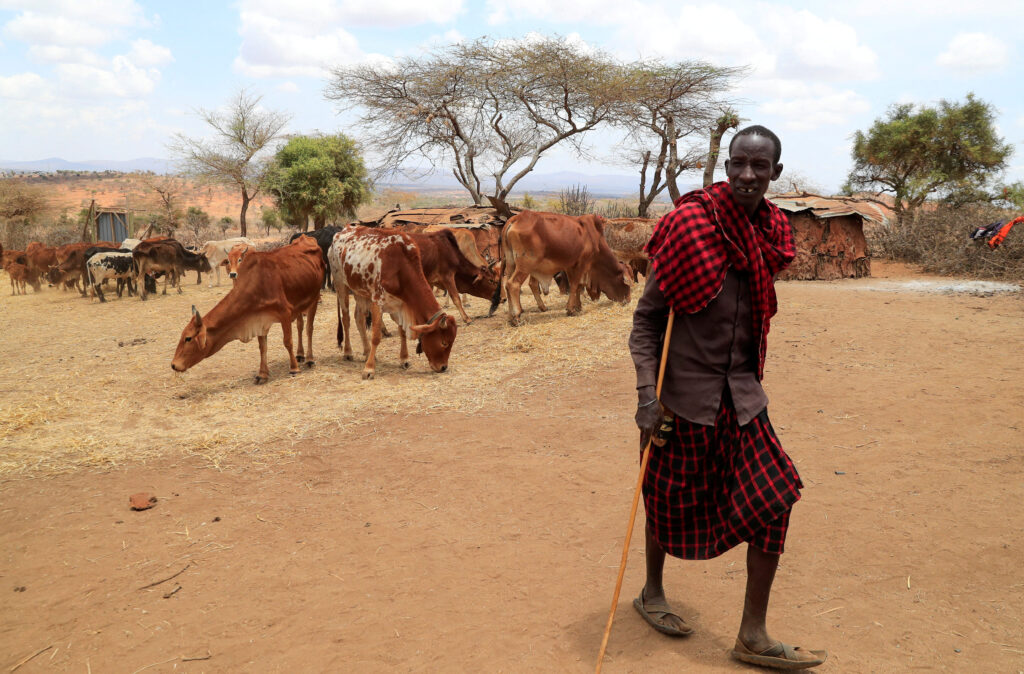
An ambitious government initiative to vaccinate all livestock in Kenya is set to begin this week, aiming to protect millions of animals against diseases. However, the campaign faces significant resistance from farmers due to misinformation and conspiracy theories about the vaccines.
The government has assured farmers that the vaccination program will be free of charge, with all costs covered by the state. Despite this, resistance remains high, particularly in regions like Nakuru County.
Local Resistance Fueled by Misinformation
Robert Nkukuu, a cattle farmer from Mai Mahiu in Nakuru County, highlighted the depth of opposition within his community:
“If the community here learns you are pro-vaccination, they will slay you just now. So stop talking about it; we don’t want it,” he told the BBC.
The plan, announced by President William Ruto in November 2024, seeks to vaccinate at least 22 million cattle and 50 million goats and sheep over three years. Currently, only 10% of Kenya’s national herd is vaccinated. The government aims to increase this rate to 85% to make Kenyan livestock products eligible for export.
Economic and Environmental Goals
President Ruto, a farm owner himself, has emphasized the necessity of vaccinations to control foot-and-mouth disease in cattle and peste des petits ruminants (PPR), also known as sheep and goat plague. He argues that the program is crucial for expanding the livestock sector and enhancing the country’s dairy and meat exports.
However, conspiracy theories have taken root, including claims that Microsoft co-founder Bill Gates is funding the initiative. These rumors gained traction after videos of Gates discussing methane emissions from livestock were shared on social media.
Debunking the Myths
Methane emissions from livestock account for about 15% of global emissions annually, according to the UN. While Gates has invested in projects to reduce methane emissions and funded vaccine research, Jonathan Mueke, a senior official in Kenya’s agriculture ministry, denied any connection between Gates and the vaccination program.
Prof. Ermias Kebreab from the University of California, Davis, clarified that no livestock vaccine to reduce methane emissions exists yet:
“I wish we had one, but that is still in development. No-one has reached [the stage of] testing in animals yet,” he told the BBC.
Despite expert reassurances, opposition figures like Maasai senator Ledama Olekina and former journalist-turned-farmer Caleb Karuga continue to stoke resistance, framing the campaign as unnecessary and potentially harmful.
Distrust and Poor Communication
Opposition leader Kalonzo Musyoka accused the government of advancing a “sinister foreign agenda” and criticized the lack of transparency around the campaign. His spokesperson called the initiative a “violation of the constitution” due to insufficient information on its implementation and technical aspects.
Analysts have attributed much of the backlash to poor communication by the government. Alphonce Shiundu, Kenya editor at fact-checking organization AfricaCheck, noted that President Ruto’s initial announcement lacked details, fueling conspiracy theories on social media.
Public Awareness Campaign Needed
The Kenya Veterinary Association (KVA) has urged the government to delay the campaign and focus on public education first. Dr. Kelvin Osore, KVA chairperson, warned that misinformation has overshadowed the initiative’s goal of disease control.
However, Dr. Allan Azegele, director of veterinary services at the agriculture ministry, argued that delays are not an option due to recent outbreaks of foot-and-mouth disease in western Kenya. These outbreaks have led to market closures and strict quarantine measures.
“We cannot wait because it is more expensive to respond to outbreaks. We have to be proactive rather than reactive,” Dr. Azegele said.
Farmer Concerns Persist
Some farmers, like David Tiriki from Kajiado County, remain skeptical, fearing foreign influence or hidden agendas:
“I suspect someone is trying to introduce a virus to our livestock so that the rich can start selling the cure to poor farmers who might not even afford it,” Tiriki told the BBC.
Others, like Ngemu Musau from Makueni County, support the initiative but demand greater transparency and assurance about vaccine safety.
“I want assurance that my cattle will be OK after the vaccine,” Musau said. “There is a need for the government to conduct intensive public awareness campaigns.”
Moving Forward
Agriculture Minister Mutahi Kagwe has pledged to make the vaccination process voluntary and to engage stakeholders in debunking misinformation. He also emphasized that the vaccines are being produced locally, aiming to rebuild trust among farmers.
The government hopes that by addressing public concerns and improving communication, the vaccination campaign will achieve its goals of controlling livestock diseases, bolstering the economy, and enhancing Kenya’s position in the global market.
